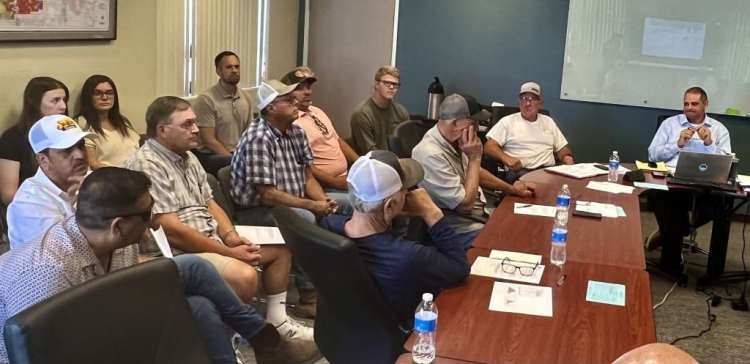By Lisa McEwen, SJV Water
Tulare County farmers are incensed by a proposed new fee structure that they say will put the entire burden of state groundwater oversight across the San Joaquin Valley solely on their shoulders.
It costs the state Water Resources Control Board about $5.5 million a year to oversee six basins in the San Joaquin Valley that have been found to have inadequate groundwater plans as part of the Sustainable Groundwater Management Act (SGMA).
Two of those subbasins have been placed on probation, under which farmers are required to pay fees to reimburse the state for those oversight costs.
“We’ve got to push back somehow. This is getting ridiculous.”
Bill DeGroot, a Pixley GSA board member.
One of those subbasins has, so far, escaped the fees pending the outcome of a legal action.
Farmers fear that could leave the Tule subbasin, in the southern portion of Tulare County’s flatlands, as the sole subbasin paying into the probationary fee kitty.
Right now, those fees include a $300-per-well annual registration fee plus $20 per acre foot pumped.
It’s the structure of the extraction fee that state staff are proposing to change.
At a June 11 online Water Board workshop, staff unveiled a new fee structure they say will repay state costs and protect small farmers.
Tule subbasin farmers say the proposed fee structure, expected to raise $6.6 million, is unfair.
“If they approve this fee structure, one subbasin will pay for the whole SGMA program, which is inequitable,” said Eric Limas, general manager of Pixley and Lower Tule River groundwater sustainability agencies.

Water Board staff said the board has been working with San Joaquin Valley subbasins for the past two years without any reimbursement from farmers, relying instead on the state’s general fund.
With California facing a $12 billion budget shortfall, that can’t continue.
Farmers will have to reimburse the state somehow and the new proposed fee structure is intended to protect small farmers, according to Natalie Stork, director of the Office of Sustainable Groundwater Management.
The proposal is to create a graduated fee structure corresponding with the amount of groundwater pumped.
It would start at $5 per acre foot for between two and 305 acre feet pumped in a year. There would be four more levels, each with a higher fee, to a maximum of $40-per-acre-foot pumped for those who extract more than 2,311 acre feet per year.
Stork said during the workshop the vast majority of pumpers in the Tule subbasin, 3,500 of 4,000 total, would fall into the $5 category, while only 34 pumpers would pay the $40 fee.
It’s anticipated the proposed pumping fee structure would bring in $6.66 million annually, which Stork said is the same amount as under the old fee structure.

That seemed fair to one workshop attendee.
“(The fee proposal) reflects an equitable approach to fees based on water usage, since the flat fee has a disproportionate impact on small scale growers with incredibly thin profit margins,” said Catherine Van Dyke of the Community Alliance for Family Farms.
The Water Board will be taking comments on the new fee proposal through June 25 with a vote scheduled Sept. 16. If approved, the new fees would apply going forward as well as to water pumped from Jan. 1 to Sept. 30, 2025.
Comments may be sent to: WaterRightsFees@waterboards.ca.gov.
The proposed fee changes went over like a lead balloon with farmers at the June 12 meeting of the Pixley GSA.
“It seems patently unfair to stick the entire cost of SGMA probationary program on one subbasin,” Geoff Vandenheuvel of Milk Producers Council said of the fees, calling the plan “egregious.”
“We’ve got to push back somehow,” said Bill DeGroot, a Pixley GSA board member. “This is getting ridiculous.”
The Tule subbasin was placed on probation in September 2024. Extraction reports for Tule pumpers are due Feb. 1, 2026 and fees will be due April 1, 2026.
Though the entire Tule subbasin was put on probation, two GSAs were immediately exempted from having to pay fees and report extractions. Those include the Delano-Earlimart and Kern-Tulare GSAs. The Lower Tule and Pixley GSAs have applied for exemptions as well.
Aside from the Tule subbasin, the Tulare Lake subbasin, which covers most of Kings County, was also placed on probation in 2024. Though an injunction that grew out of a lawsuit filed against the Water Board by the Kings County Farm Bureau put the fees on hold.
The state appealed that injunction, which may be decided by the 5th District Court of Appeal any time.
Other subbasins in the Water Board’s probationary crosshairs include the Kern, which will go before the board Sept. 17, and the Delta-Mendota, which hasn’t received a hearing date yet.
The Water Board canceled the Kaweah subbasin’s probationary hearing at the beginning of this year in order to more fully study its latest groundwater plan. And the board recently found the Chowchilla subbasin had made such progress, it was taken off the enforcement track and sent back to the Department of Water Resources.
The goal of SGMA is to halt severe, chronic groundwater depletion and bring aquifers into balance by 2040.



